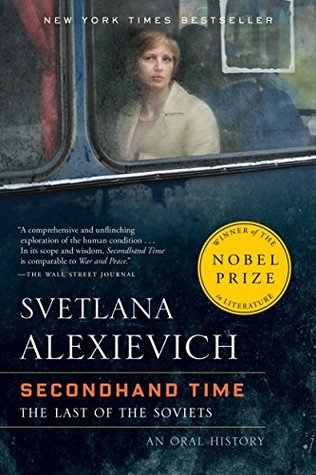More on this book
Community
Kindle Notes & Highlights
Read between
February 28 - March 6, 2021
Today, people just want to live their lives, they don’t need some great Idea. This is entirely new for Russia; it’s unprecedented in Russian literature. At heart, we’re built for war. We were always either fighting or preparing to fight.
More often, people were irritated with freedom. “I buy three newspapers and each one of them has its own version of the truth. Where’s the real truth? You used to be able to get up in the morning, read Pravda, and know all you needed to know, understand everything you needed to understand.”
—What have I learned? I learned that the heroes of one era aren’t likely to be the heroes of the next.
For us, the kitchen is not just where we cook, it’s a dining room, a guest room, an office, a soapbox. A space for group therapy sessions. In the nineteenth century, all of Russian culture was concentrated on aristocratic estates; in the twentieth century, it lived on in our kitchens. That’s where perestroika really took place.
Happiness is here, huh? Sure, there’s salami and bananas. We’re rolling around in shit and eating foreign food. Instead of a Motherland, we live in a huge supermarket. If this is freedom, I don’t need it. To hell with it!
This was the end of our nightly kitchen vigils and the beginning of making money then making more money on the side. Money became synonymous with freedom.
My husband is an economist, and it would drive him up the wall: “Poets are capable of setting people’s hearts on fire with words. You’re going to end up with a revolution on your hands—and then what? How are you going to build democracy? Who’s going to do it? I can already see what your efforts are leading to.” He laughed at me. We ended up getting divorced because of it…But as it turned out, he was right…
Our lives reel between barracks and bedlam. Right now, the pendulum is in the middle. Half of the country is waiting for a new Stalin to come and put things in order.
I remember my father’s words: “It’s possible to survive the camps, but you can’t survive other people.”
We’ll all die…And everything will be all right.
I can do without a lot of things, the only thing I can’t do without is the past.
Here in Russia, you’re not going to get anything done by force. Getting rid of an incompetent leader isn’t our biggest problem. The question is what happens next.’ ”
We were hurtling into an abyss. We had a great nation, it was victorious in a terrifying war, and it was collapsing. China didn’t fall. And neither did North Korea, where the people were starving to death. While little socialist Cuba stood, we were falling. And we weren’t defeated by tanks and missiles, we were destroyed by our own greatest strength: our spirit. The system and the Party rotted from the inside.
We lived in our kitchens…The whole country lived in their kitchens. You’d go to somebody’s house, drink wine, listen to songs, talk about poetry. There’s an open tin can, slices of black bread. Everyone’s happy.
Our men are martyrs, all of them are traumatized, either from war or from prison. From life in the camps. War and prison are the two most important words in the Russian language. Truly Russian words! Russian women have never had normal men. They keep healing and healing them. Treating them like heroes and children at the same time. Saving them.
Whenever I went into a normal home, with a normal family, I would get tense—what was all that stuff for? So many spoons, forks, cups. The simplest things would confound me…the very basics. For instance, why would anyone need two pairs of shoes?
We’ve had it up to here with greatness! We want something on the human scale. Normal. Mundane…you know, everyday stuff! It’s enough to remember the great stuff occasionally, after a little vodka…We were the first ones in space…and manufactured the best tanks in the world. But there was no detergent or toilet paper.
—I have no desire to go out into the street and try to accomplish anything. It’s better to do nothing. No good, no evil. What’s good today will turn out to have been evil tomorrow.
The people who read books and dreamed of flying, like Chekhov’s seagull, were replaced by those who didn’t read but knew how to fly.
No one understands a stranger’s tragedy, God willing you might understand your own.


